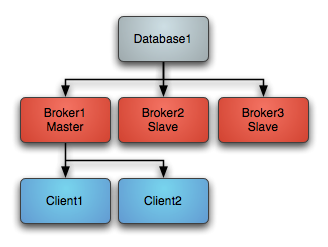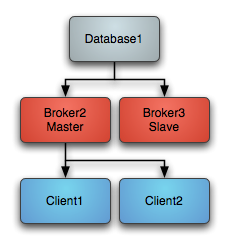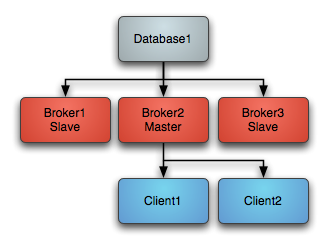Shared File System Master Slave
Features > Clustering > MasterSlave > Shared File System Master Slave
Shared File System Master Slave
If you have a SAN or shared file system it can be used to provide high availability such that if a broker is killed, another broker can take over immediately.
Ensure your shared file locks work
Note that the requirements of this failover system are a distributed file system like a SAN for which exclusive file locks work reliably. If you do not have such a thing available then consider using MasterSlave instead which implements something similar but working on commodity hardware using local file systems which ActiveMQ Classic does the replication.
OCFS2 Warning
Was testing using OCFS2 and both brokers thought they had the master lock - this is because “OCFS2 only supports locking with ‘fcntl’ and not ‘lockf and flock’, therefore mutex file locking from Java isn’t supported.”
From http://sources.redhat.com/cluster/faq.html#gfs_vs_ocfs2 :
OCFS2: No cluster-aware flock or POSIX locks
GFS: fully supports Cluster-wide flocks and POSIX locks and is supported.
See this JIRA for more discussion: https://issues.apache.org/jira/browse/AMQ-4378NFSv3 Warning
In the event of an abnormal NFSv3 client termination (i.e., the ActiveMQ Classic master broker), the NFSv3 server will not timeout the lock that is held by that client. This effectively renders the ActiveMQ Classic data directory inaccessible because the ActiveMQ Classic slave broker can’t acquire the lock and therefore cannot start up. The only solution to this predicament with NFSv3 is to reboot all ActiveMQ Classic instances to reset everything.
Use of NFSv4 is another solution because its design includes timeouts for locks. When using NFSv4 and the client holding the lock experiences an abnormal termination, by design, the lock is released after 30 seconds, allowing another client to grab the lock. For more information about this, see this blog entry.
Basically you can run as many brokers as you wish from the same shared file system directory. The first broker to grab the exclusive lock on the file is the master broker. If that broker dies and releases the lock then another broker takes over. The slave brokers sit in a loop trying to grab the lock from the master broker.
The following example shows how to configure a broker for Shared File System Master Slave where /sharedFileSystem is some directory on a shared file system. It is just a case of configuring a file based store to use a shared directory.
<persistenceAdapter>
<kahaDB directory="/sharedFileSystem/sharedBrokerData"/>
</persistenceAdapter>
or:
<persistenceAdapter>
<levelDB directory="/sharedFileSystem/sharedBrokerData"/>
</persistenceAdapter>
or:
<persistenceAdapter>
<amqPersistenceAdapter directory="/sharedFileSystem/sharedBrokerData"/>
</persistenceAdapter>
Startup
On startup one master grabs an exclusive lock on the broker file directory - all other brokers are slaves and pause waiting for the exclusive lock.

Clients should be using the Failover Transport to connect to the available brokers. e.g. using a URL something like the following
failover:(tcp://broker1:61616,tcp://broker2:61616,tcp://broker3:61616)
Only the master broker starts up its transport connectors and so the clients can only connect to the master.
Master failure
If the master looses the exclusive lock then it immediately shuts down. If a master shuts down or fails, one of the other slaves will grab the lock and so the topology switches to the following diagram

One of the other slaves immediately grabs the exclusive lock on the file system to them commences becoming the master, starting all of its transport connectors.
Clients loose connection to the stopped master and then the failover transport tries to connect to the available brokers - of which the only one available is the new master.
Master restart
At any time you can restart other brokers which join the cluster and start as slaves waiting to become a master if the master is shutdown or a failure occurs. So the following topology is created after a restart of an old master…

Scheduler Support
ActiveMQ Classic maintains information about schedules independent to the settings in the persistence adapter. With a shared file-system it is therefore important to tell ActiveMQ Classic expressly where to store scheduler information. To do this, set the dataDirectory attribute on the broker, for example:
<broker xmlns="http://activemq.apache.org/schema/core"
dataDirectory="/some/location"
brokerName="mmuserb2" useJmx="true" advisorySupport="false"
persistent="true" deleteAllMessagesOnStartup="false"
useShutdownHook="false" schedulerSupport="true">

